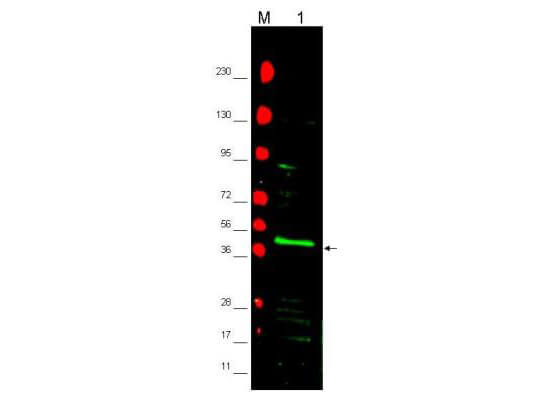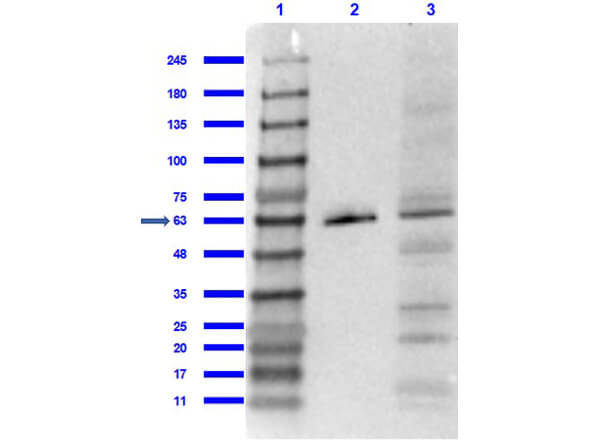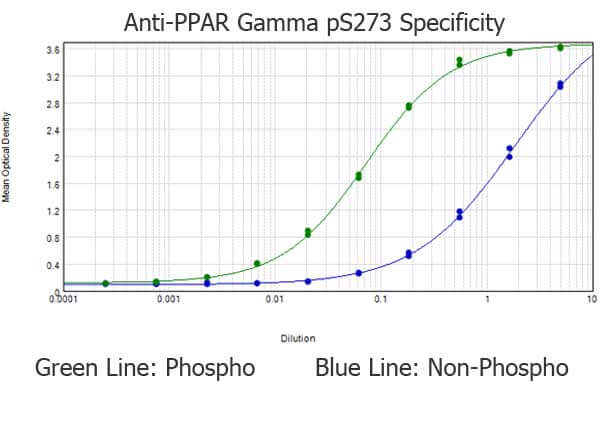Datasheet is currently unavailable. Try again or CONTACT US
PPAR gamma 2 Antibody
Rabbit Polyclonal
1 References
600-401-418
100 µg
Liquid (sterile filtered)
WB, ELISA, IHC
Mouse
Rabbit
Shipping info:
$50.00 to US & $70.00 to Canada for most products. Final costs are calculated at checkout.
Product Details
Anti-PPAR gamma 2 (N-terminal specific) (RABBIT) Antibody - 600-401-418
rabbit anti-PPAR gamma 2 antibody, Peroxisome proliferator-activated receptor gamma, Nuclear receptor subfamily 1 group C member 3, NR1C3, PPARG, PPAR gamma, PPARG2 antibody
Rabbit
Polyclonal
IgG
Target Details
PPARG - View All PPARG Products
Mouse
Conjugated Peptide
This affinity purified antibody was prepared from whole rabbit serum produced by repeated immunizations with a synthetic peptide corresponding to a region near the amino terminus of human PPAR gamma 2.
This affinity purified antibody is directed against human PPAR gamma isoform 2 protein. The product was affinity purified from monospecific antiserum by immunoaffinity purification. A BLAST analysis was used to suggest reactivity with this protein from human and macaque based on 100% homology for the immunogen sequence. Cross reactivity with PPARg2 protein from dog and swine is likely due to 94% homology (15/16 identities) with the protein from these sources. Cross reactivity does occur with PPARg2 from mouse. Mouse PPARg2 shows 87% homology to the immunogen. Cross reactivity with PPARg2 homologues from other sources has not been determined. No reactivity is expected against other subtypes of PPAR.
Application Details
ELISA, WB
IHC
- View References
This affinity purified antibody has been tested for use in ELISA and by western blot. Specific conditions for reactivity should be optimized by the end user. Expect a single band approximately 55 kDa in size corresponding to PPARg2 by western blot in the appropriate tissue or cell lysate.
Formulation
1.0 mg/mL by UV absorbance at 280 nm
0.02 M Potassium Phosphate, 0.15 M Sodium Chloride, pH 7.2
0.01% (w/v) Sodium Azide
None
Shipping & Handling
Dry Ice
Store vial at -20° C prior to opening. Aliquot contents and freeze at -20° C or below for extended storage. Avoid cycles of freezing and thawing. Centrifuge product if not completely clear after standing at room temperature. This product is stable for several weeks at 4° C as an undiluted liquid. Dilute only prior to immediate use.
Expiration date is one (1) year from date of receipt.
Since their discovery in the early 1990's, the peroxisome proliferator activated receptors (PPARs) have attracted significant attention. This is primarily because PPARs serve as receptors for two very important classes of drugs: the hypolipidemic fibrates and the insulin sensitizing thiazolidinediones. Peroxisome proliferators are non-genotoxic carcinogens that are purported to exert their effect on cells through their interaction with members of the nuclear hormone receptor family termed PPARs. Nuclear hormone receptors are ligand-dependent intracellular proteins that stimulate transcription of specific genes by binding to specific DNA sequences following activation by the appropriate ligand. Upon binding fatty acids or hypolipidemic drugs, PPARs form heterodimers with retinoid X receptors (RXRs) and these heterodimers regulate the expression of target genes. There are 3 known subtypes of PPARs: PPAR-alpha, PPAR-delta and PPAR-gamma. Mostly target genes are involved in the catabolism of fatty acids. Conversely, PPAR-gamma is activated by peroxisome proliferators such as prostaglandins, leukotrienes and anti-diabetic thiazolidinediones and affects the expression of genes involved in the storage of the fatty acids. PPAR-gamma may also be involved in adipocyte differentiation. It has also been shown that PPARs can induce transcription of acyl coenzyme A oxidase and cytochrome P450 through interaction with specific response elements.
Salgia MM et al. (2019). Different roles of peroxisome proliferator-activated receptor gamma isoforms in prostate cancer. Am J Clin Exp Urol.
Applications
IHC, ICC, Histology; WB, IB, PCA
This product is for research use only and is not intended for therapeutic or diagnostic applications. Please contact a technical service representative for more information. All products of animal origin manufactured by Rockland Immunochemicals are derived from starting materials of North American origin. Collection was performed in United States Department of Agriculture (USDA) inspected facilities and all materials have been inspected and certified to be free of disease and suitable for exportation. All properties listed are typical characteristics and are not specifications. All suggestions and data are offered in good faith but without guarantee as conditions and methods of use of our products are beyond our control. All claims must be made within 30 days following the date of delivery. The prospective user must determine the suitability of our materials before adopting them on a commercial scale. Suggested uses of our products are not recommendations to use our products in violation of any patent or as a license under any patent of Rockland Immunochemicals, Inc. If you require a commercial license to use this material and do not have one, then return this material, unopened to: Rockland Inc., P.O. BOX 5199, Limerick, Pennsylvania, USA.



